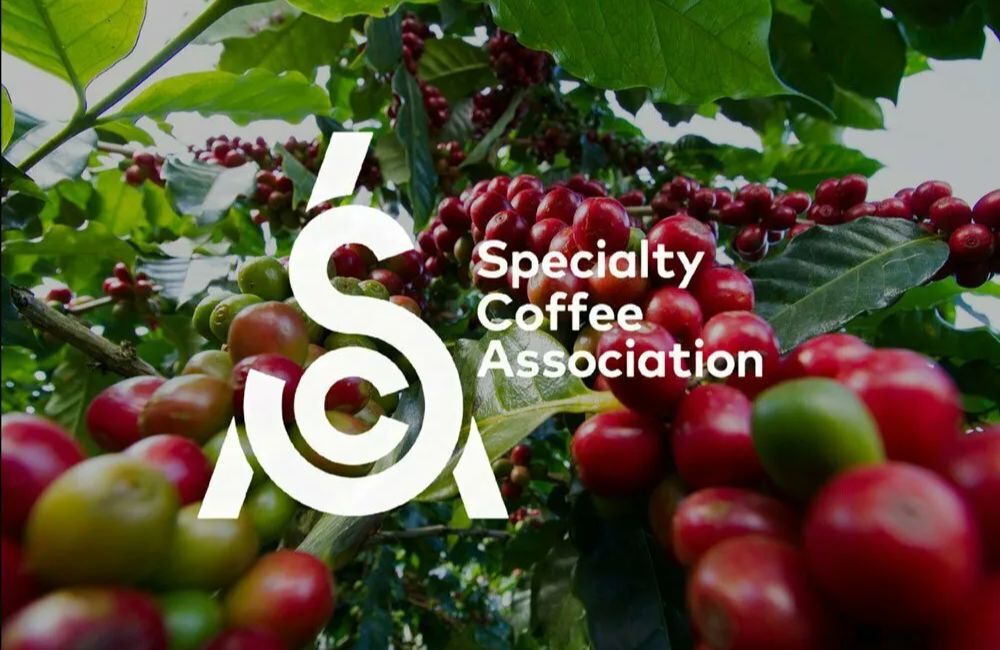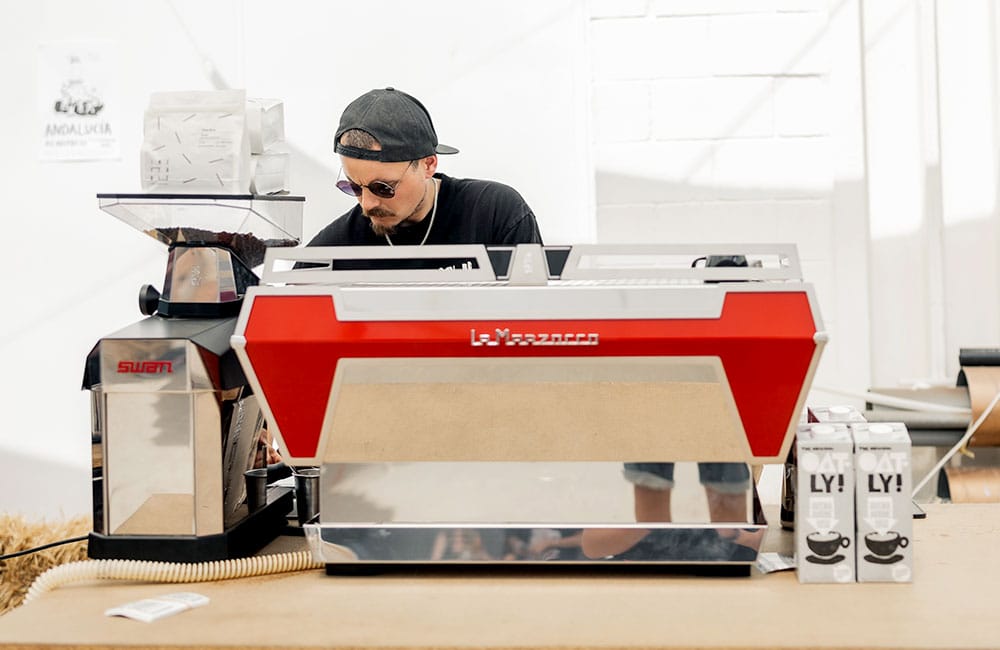Todo lo que necesitas saber sobre la Speciality Coffee Association (SCA)
En el mundo del café de especialidad hay un nombre que surge a menudo, la Specialty Coffee Association (SCA, por sus siglas en inglés). Para muchos la SCA es una gran desconocida, pero su labor ha sido y es muy importante a la hora de establecer estándares para el café de especialidad, realizar labores investigadoras y educativas y ofrecer apoyo a todos los involucrado en la cadena de producción de un café de calidad.
En este post vamos a hablar sobre qué es la SCA su historia y su labor para que la próxima vez que veas esta sigla no te queden dudas.
¿Qué es la Speciality Coffee Association?

La Specialty Coffee Association (SCA) es una organización internacional sin animo de lucro que reúne a profesionales de la industria del café y entusiastas de todo el mundo con el objetivo de promover y mejorar la calidad del café de especialidad en todas sus etapas, desde el cultivo hasta el consumo.
La Specialty Coffee Association of America (SCAA) se estableció en 1982 por un pequeño grupo de profesionales del café que buscaban un foro común para discutir problemas y establecer estándares de calidad. La Specialty Coffee Association of Europe (SCAE) se formó en una reunión de representantes de la comunidad cafetera europea en Londres, en 1998.
La Specialty Coffee Association (SCA) es el resultado de la unificación en 2017 de la Specialty Coffee Association of America (SCAA) y la Specialty Coffee Association of Europe (SCAE). La SCA tiene más de 60.000 miembros en más de 100 países. Los miembros de la SCA incluyen baristas, cafeterías, tostadores, distribuidores, importadores, exportadores, productores y otros profesionales del café.
La misión de la SCA es "cultivar una comunidad global de profesionales del café que inspiren y apoyen el crecimiento del café de especialidad". La SCA cumple este propósito a través de una variedad de programas y recursos
¿Por qué es importante la SCA para el café de especialidad?
La importancia de la SCA radica en ser una organización internacional transaccional que representa a la industria del café de especialidad. La SCA tiene como objetivo elevar la calidad del café de especialidad y promover su consumo en todo el mundo. La SCA hace esto a través de una variedad de actividades, incluyendo la educación, la investigación y la certificación.
La SCA es importante por varias razones. En primer lugar, la SCA ayuda a asegurar que el café de especialidad se cultive, coseche, procese y tueste con altos estándares de calidad. En segundo lugar, la SCA ayuda a promover el consumo de café de especialidad educando al público sobre los beneficios de esta bebida. En tercer lugar, la SCA ayuda a desarrollar nuevos mercados para el café de especialidad, lo que beneficia a los agricultores, tostadores y minoristas de todo el mundo.
Definición de la SCA del café de especialidad
 Aunque la misma SCA reconoce que no hay una definición exacta de qué es el café de especialidad, sí ofrece una aproximación.
Aunque la misma SCA reconoce que no hay una definición exacta de qué es el café de especialidad, sí ofrece una aproximación.
La SCA define el café de especialidad como aquel que se obtiene a partir de granos de café seleccionados, procesados y tostados de manera experta, y que tiene un sabor limpio y complejo.
El café de especialidad debe puntuarse al menos 80 puntos en una escala de 100 puntos, y debe cumplir con ciertos criterios de calidad, como la ausencia de defectos, un nivel de tueste uniforme y un sabor equilibrado.
Para establecer un modelo de puntuación fiable y recurrente, además de asegurar la calidad de todos los pasos en la cadena de producción, la SCA realiza una serie de actividades para proponer estándares.
Principales actividades de la SCA
Este listado, que luego expandiremos, te dará un resumen global de las actividades de la SCA:
- Estándares y Certificaciones: La SCA ha establecido rigurosos estándares para la calidad del café en diferentes aspectos, como el cultivo sostenible, la calificación del grano, las habilidades del barista y el equipamiento de café. Ofrecen programas de certificación, como el "Programa de Certificación de Cafés Especiales" y el "Programa de Certificación de Baristas", para promover la excelencia en la industria.
- Eventos: La SCA organiza eventos importantes en la industria del café, como la Expo de Café de Especialidad de la SCA (SCA Specialty Coffee Expo) y la Competición Mundial de Baristas (World Barista Championship), donde los mejores baristas del mundo compiten por el título de campeón mundial.
- Investigación y Educación: La asociación promueve la investigación y la educación en la industria del café especial. Proporciona recursos, publicaciones, talleres y capacitación para sus miembros y el público en general para mejorar la calidad y sostenibilidad del café.
- Advocacy: La SCA abogó por políticas que apoyan la industria del café de especialidad, como el comercio justo y la sostenibilidad.
Estándares y certificaciones de la SCA
La Specialty Coffee Association (SCA) tiene varios estándares y programas de certificación relacionados con diferentes aspectos de la industria del café especial. Estos estándares y certificaciones buscan promover la calidad, sostenibilidad y profesionalismo en todos los niveles de la cadena de producción y suministro de café. Algunos de los principales estándares y programas de certificación de la SCA incluyen:
- Programa de Certificación de Café de Especialidad (Coffee Quality Institute - CQI): Este programa se centra en la calidad del café y está diseñado para evaluar y certificar cafés especiales que cumplen con ciertos criterios de calidad. Los cafés que alcanzan ciertas puntuaciones en términos de sabor, aroma, acidez, cuerpo y otros atributos, pueden recibir la certificación de "Café de Especialidad" (Specialty Coffee).
- Programa de Certificación de Baristas (Barista Guild): La SCA ofrece un programa de certificación para baristas que deseen demostrar sus habilidades y conocimientos en la preparación de café. El programa incluye diferentes niveles de certificación, desde el Nivel Básico hasta el Nivel Máster, y cubre aspectos como la preparación del espresso, el latte art, la cata de café y el conocimiento de la cadena de suministro del café.
- Programa de Certificación de Tostadores (Roaster Guild): Este programa está diseñado para tostadores de café y evalúa sus habilidades en el proceso de tostado. Los tostadores pueden obtener certificaciones en diferentes niveles, lo que demuestra su capacidad para tostar café de manera consistente y de alta calidad.
- Programa de Certificación de Caficultura Sostenible (Sustainable Coffee Program): La SCA promueve prácticas de cultivo sostenible a través de este programa de certificación. Se enfoca en la producción de café de manera ambientalmente responsable, socialmente justa y económicamente viable.
El Programa de Certificación de Café de Especialidad

El Programa de Certificación de Cafés Especiales tiene como objetivo evaluar y reconocer la calidad excepcional del café.
Este programa es administrado por el Coffee Quality Institute (CQI), una organización aliada de la SCA. Los cafés que cumplen con ciertos estándares de calidad y obtienen altas puntuaciones en las pruebas de catación pueden recibir la certificación de "Café de especialidad" (Specialty Coffee).
El proceso de certificación implica que los cafés sean evaluados por catadores certificados según los Protocolos de Catación Q, un método estandarizado para evaluar de manera objetiva los atributos sensoriales del café.
Los Protocolos de Catación Q analizan atributos como el sabor, el aroma, la acidez, el cuerpo, el equilibrio y otros elementos que contribuyen a la calidad general del café.
El Programa de Certificación de Baristas (Barista Guild)
El Programa de Certificación de Baristas de la SCA está diseñado para elevar el nivel de habilidades y conocimientos de los baristas en la preparación y presentación del café. El programa ofrece diferentes niveles de certificación, cada uno de los cuales evalúa diversas habilidades relacionadas con el arte de preparar y servir café.
- Nivel Básico: En este nivel, los baristas adquieren conocimientos fundamentales sobre el café, la molienda, la preparación del espresso y la texturización de la leche. También aprenden a mantener el equipo y garantizar la calidad en la preparación.
- Nivel Intermedio: En este nivel, los baristas profundizan en sus habilidades de preparación y aprenden técnicas avanzadas, como el arte latte, el uso de diferentes métodos de extracción y la gestión de tiempos en la preparación del café.
- Nivel Avanzado: En este nivel, los baristas demuestran un alto nivel de habilidad y conocimiento en la preparación y servicio del café. Deben realizar evaluaciones prácticas y teóricas para obtener esta certificación.
Programa de Certificación de Tostadores (Roaster Guild):
El Programa de Certificación de Tostadores tiene como objetivo evaluar las habilidades y el conocimiento de los tostadores de café. Este programa se centra en el proceso de tostado, que es crucial para desarrollar los sabores y aromas del café.
- Nivel Básico: En este nivel, los tostadores aprenden los conceptos fundamentales del tostado, incluida la influencia de las variables del proceso en los perfiles de sabor del café.
- Nivel Intermedio: En este nivel, los tostadores profundizan en la comprensión de los procesos de tostado y adquieren habilidades prácticas para tostar café de manera consistente y de alta calidad.
- Nivel Avanzado: En este nivel, los tostadores deben demostrar su dominio en la evaluación de la calidad del café tostado, la resolución de problemas y la gestión de tostadoras comerciales.
Programa de Certificación de Caficultura Sostenible (Sustainable Coffee Program):
El Programa de Certificación de Caficultura Sostenible busca promover prácticas agrícolas sostenibles en la producción de café. La SCA está comprometida con la sostenibilidad y la responsabilidad social en la industria del café, y este programa fomenta la adopción de prácticas que tengan un impacto positivo en el medio ambiente y en las comunidades locales.
Los criterios para obtener esta certificación incluyen aspectos como el manejo adecuado de recursos naturales, la protección de la biodiversidad, la seguridad y bienestar de los trabajadores, la equidad de género, el cumplimiento de leyes laborales y normas sociales, entre otros.
Eventos más importantes de la SCA

La SCA cumple también un papel importante a la hora organizar eventos clave en la industria del café de especialidad. Estos eventos son oportunidades para que profesionales, entusiastas y empresas del café se reúnan, compartan conocimientos, presenten productos y tecnologías innovadoras, y celebren la pasión por el café.
Estos son algunos de los eventos más destacados que la SCA ha organizado en el pasado y que sigue organizando:
SCA Specialty Coffee Expo
Es el evento más grande de la SCA y uno de los más importantes en la industria del café de especialidad. La Expo de Café de Especialidad reúne a miles de personas, incluyendo baristas, tostadores, agricultores, importadores, exportadores, proveedores y otros profesionales relacionados con el café.
La feria ofrece una variedad de exhibiciones comerciales donde las empresas pueden mostrar sus productos, equipos y servicios relacionados con el café. También incluye talleres, conferencias y paneles de discusión sobre diversos temas, como tendencias en la industria, métodos de preparación, sostenibilidad, innovación y más.
Además, durante la Expo, se llevan a cabo competiciones como el Campeonato Mundial de Baristas, el Campeonato Mundial de Brewers Cup y el Campeonato Mundial de Latte Art, donde los mejores baristas del mundo compiten por los títulos.
World Barista Championship
El Campeonato Mundial de Baristas. Este evento reúne a los mejores baristas de diferentes países para competir en una serie de rondas en las que deben preparar y servir espresso y bebidas con leche a un panel de jueces.
Los competidores son evaluados en la calidad de sus bebidas, sus habilidades técnicas, el arte latte, el conocimiento del café y su capacidad para ofrecer una experiencia excepcional al cliente. El ganador se convierte en el Campeón Mundial de Baristas y es reconocido como un líder en la industria del café.
World Brewers Cup
El Campeonato Mundial de elaboraciones de filtro: Este evento se enfoca en la preparación de café de filtro utilizando diferentes métodos, como la V60, Chemex y AeroPress, entre otros.
Los competidores presentan café de especialidad cuidadosamente seleccionados y preparados para resaltar las características únicas de los granos. Los jueces evalúan la claridad, sabor, acidez, dulzura y otros aspectos del café preparado. El campeón se convierte en el Campeón Mundial de Brewers Cup.
World Latte Art Championship
El Campeonato Mundial de Latte Art. Este evento pone a prueba las habilidades de los baristas para crear impresionantes diseños artísticos en las bebidas con leche, como cappuccinos y lattes.
Los competidores demuestran su destreza en el vertido del café con leche, creando patrones y diseños atractivos. Los jueces evalúan la calidad y complejidad de los diseños, así como la precisión técnica. El ganador se convierte en el Campeón Mundial de Latte Art.
En total, la SCA organiza siete campeonatos mundiales, a esto tres se les añaden: World Coffee In Good Spirits, World Cup Tasters, World Coffee Roasting y el World Cezve/Ibrik. Todos estos campeonatos cuentan con ediciones locales y nacionales clasificatorias. Además de esto eventos, la SCA organiza muchos otros para la promoción del café de especialidad.
Iniciativas de educación y promoción del café de especialidad

La Specialty Coffee Association ha desarrollado diversos proyectos educativos para fomentar el conocimiento y la formación en la industria del café de especialidad. Estos proyectos están diseñados para capacitar a profesionales y entusiastas del café en diferentes aspectos, desde la producción y el procesamiento hasta la preparación y el servicio. Algunos de los proyectos educativos más destacados de la SCA incluyen:
- SCA Coffee Skills Program (Programa de Habilidades en Café de la SCA): Es un programa integral de educación y capacitación que cubre una amplia gama de temas relacionados con el café. Está diseñado para aquellos que desean desarrollar sus habilidades en diferentes áreas de la industria del café. El programa se divide en varios módulos, cada uno enfocado en aspectos específicos, como el cultivo del café, el tostado, la preparación de espresso, la catación y más. Los participantes pueden seguir diferentes rutas de aprendizaje y obtener certificaciones en función de sus intereses y objetivos.
- Sensory Summit (Cumbre Sensorial): Este proyecto educativo se enfoca en la mejora de las habilidades de catación y la apreciación sensorial del café. La Cumbre Sensorial reúne a expertos catadores, tostadores y profesionales del café para explorar cómo los aspectos sensoriales influyen en la calidad y el sabor del café. Los participantes pueden participar en talleres prácticos y conferencias sobre la catación y el análisis de los perfiles de sabor del café.
- Sustainability Webinars (Seminarios web sobre sostenibilidad): La SCA organiza seminarios web que abordan temas de sostenibilidad en la industria del café. Estos webinars presentan investigaciones y prácticas sostenibles, así como iniciativas para promover la responsabilidad social y ambiental en toda la cadena de suministro del café.
- Coffee Roasters Guild Retreat: Este proyecto educativo está enfocado en la formación y desarrollo profesional de tostadores de café. Durante el Coffee Roasters Guild Retreat, los tostadores pueden participar en actividades prácticas y teóricas relacionadas con el proceso de tostado, el análisis de perfiles de sabor y otras habilidades relevantes para su labor.
Estos son solo algunos ejemplos de los proyectos educativos de la Specialty Coffee Association. La SCA se esfuerza constantemente por brindar oportunidades de aprendizaje y desarrollo a los profesionales y entusiastas del café, con el objetivo de elevar los estándares de calidad en toda la industria y promover el conocimiento y apreciación por el café de especialidad.
El programa Coffee Skills de la SCA
La SCA ofrece un programa llamado "Coffee Skills Program" (Programa de habilidades en café). Este programa está diseñado para proporcionar una estructura educativa y estandarizada para aquellos que desean mejorar sus habilidades en la industria del café de especialidad.
El Coffee Skills Program se divide en diferentes módulos, cada uno centrado en un área específica del conocimiento y habilidades relacionadas con el café. Estos módulos están agrupados en cuatro rutas principales:
- Introduction to Coffee (Introducción al café): Esta ruta está diseñada para aquellos que deseen aprender los conceptos básicos del café, como el cultivo, procesamiento, tueste, preparación y cata.
- Barista Skills (Habilidades de barista): Esta ruta se enfoca en el proceso de preparación del café y las habilidades necesarias para ser un barista profesional. Incluye técnicas de extracción, espumado de leche, preparación de bebidas de café y latte art, entre otros temas.
- Brewing (Preparación de café): Esta ruta explora las diversas metodologías de preparación de café, incluyendo métodos de filtro, prensa francesa, AeroPress, entre otros.
- Roasting (Tueste): Esta ruta se centra en el proceso de tueste del café y cómo afecta al sabor y calidad de este.
Cada ruta se divide en diferentes niveles de habilidad, desde el nivel básico hasta el avanzado. Los cursos están diseñados para que los estudiantes progresen desde el nivel Foundation (Fundamental) hasta el nivel Intermediate (Intermedio) y finalmente el nivel Professional (Profesional) en cada ruta.
El objetivo del Coffee Skills Program de la SCA es proporcionar un estándar de calidad y conocimiento en la industria del café de especialidad, asegurando que los profesionales del café tengan las habilidades necesarias para ofrecer una experiencia de alta calidad a los clientes.
También permite a los participantes obtener certificaciones reconocidas internacionalmente en cada una de las rutas y niveles, lo que puede ser de beneficio para su desarrollo profesional y oportunidades laborales en la industria del café.
La SCA también realiza tareas de investigación

La SCA también apuesta por la promoción y el desarrollo de la investigación en la industria del café de especialidad. A través de su trabajo de investigación, la SCA busca comprender mejor los diferentes aspectos del café, desde su cultivo y procesamiento hasta su preparación y consumo, con el objetivo de mejorar la calidad del café y promover prácticas sostenibles en toda la cadena de suministro.
Algunas áreas de investigación en las que la SCA ha estado involucrada incluyen:
- Perfiles de Sabor del Café: La SCA ha realizado investigaciones para entender los diferentes perfiles de sabor que se pueden encontrar en el café, dependiendo de factores como el origen del café, las variedades de cultivo, el proceso de tostado y los métodos de preparación. Estas investigaciones ayudan a los profesionales del café a comprender cómo los diferentes factores influyen en el sabor final de la bebida y cómo pueden destacar las características únicas de cada café.
- Sostenibilidad en la Caficultura: La SCA ha realizado estudios sobre prácticas de caficultura sostenible que incluyen prácticas agrícolas responsables, conservación del suelo, gestión del agua y reducción de residuos. Estas investigaciones buscan promover la sostenibilidad ambiental y social en las comunidades cafeteras.
- Impacto del Proceso de Tostado: La SCA ha investigado cómo el proceso de tostado afecta la calidad y el sabor del café. Estos estudios ayudan a los tostadores a comprender cómo ajustar sus perfiles de tostado para resaltar las características deseadas de los granos de café.
- Evaluación de Equipos de Preparación: La SCA ha llevado a cabo investigaciones para evaluar el rendimiento de diferentes equipos de preparación de café, como máquinas de espresso, molinos y otros dispositivos utilizados en cafeterías y hogares. Estas investigaciones ayudan a los consumidores y profesionales del café a tomar decisiones informadas sobre qué equipos se ajustan mejor a sus necesidades y expectativas.
- Impacto del Agua en la Preparación del Café: La calidad del agua utilizada en la preparación del café puede tener un impacto significativo en el sabor final de la bebida. La SCA ha investigado cómo las diferentes características del agua, como el contenido de minerales y el pH, afectan la extracción y el sabor del café.
Estos son solo algunos ejemplos de las áreas de investigación en las que la Specialty Coffee Association ha estado trabajando para mejorar la calidad y la sostenibilidad del café de especialidad.
Defensa de los intereses del café de especialidad (advocay)
El advocacy es una parte importante del trabajo de la SCA para representar y promover los intereses de sus miembros y de la industria en general. Algunas de las áreas clave de advocacy en las que la SCA ha estado involucrada incluyen:
Defensa de la sostenibilidad: La SCA ha abogado por prácticas más sostenibles en toda la cadena de suministro del café, desde el cultivo hasta el consumo. Esto incluye el apoyo a prácticas agrícolas sostenibles, la promoción de prácticas comerciales justas y equitativas, y el fomento de la conservación del medio ambiente y la biodiversidad.
Acceso a mercados justos: La SCA ha trabajado para promover el acceso a mercados justos y transparentes para los productores de café de especialidad. Esto implica abogar por precios justos para los agricultores y el fomento de relaciones comerciales éticas y responsables en la industria.
Promoción de la calidad del café: La SCA ha abogado por la promoción de la calidad y excelencia en el café especial. Esto incluye el establecimiento y la promoción de estándares de calidad en la producción, tostado y preparación del café.
Apoyo a la educación y capacitación: La SCA ha abogado por el acceso a la educación y la capacitación de alta calidad en la industria del café. Esto incluye el desarrollo de programas educativos, la promoción de oportunidades de aprendizaje y la difusión de conocimientos en la comunidad cafetera.
Influencia en políticas y regulaciones: La SCA ha trabajado para influir en políticas y regulaciones que afectan a la industria del café. Esto puede incluir cuestiones relacionadas con el comercio internacional, la sostenibilidad ambiental, la protección de los derechos laborales y otras áreas que impactan a los actores de la industria.
La SCA colabora con otros actores de la industria, como organizaciones gubernamentales, empresas y grupos de la sociedad civil, para abordar estos problemas de manera efectiva y representar los intereses de la comunidad cafetera en todo el mundo.
Como beneficia la SCA a los productores de café en origen

La Specialty Coffee Association (SCA) beneficia a los productores de café en origen de varias maneras.
Promoción de la calidad del café: La SCA es un defensor de la calidad del café especial. Al promover estándares de calidad y proporcionar programas de certificación como el "Programa de Certificación de Café de Especialidad", la SCA crea incentivos para que los productores en origen se esfuercen por producir café de alta calidad. Los cafés de alta calidad generalmente obtienen mejores precios en el mercado, lo que puede mejorar los ingresos y la sostenibilidad económica de los productores.
Acceso a información y conocimiento: La SCA ofrece una gran cantidad de información y recursos sobre café, que incluyen publicaciones, investigaciones, talleres, conferencias y programas educativos. Esta información es accesible para todos los miembros, incluidos los productores de café en origen, lo que les brinda la oportunidad de aprender sobre las últimas tendencias, prácticas agrícolas sostenibles, técnicas de procesamiento y otros temas relevantes para mejorar su producción y calidad del café.
Eventos y redes de contacto: La SCA organiza eventos como la "SCA Specialty Coffee Expo" y la "Sensory Summit", que ofrecen a los productores la oportunidad de conectarse con otros profesionales de la industria, tostadores, compradores y expertos en café. Estos eventos permiten el intercambio de conocimientos, la identificación de nuevas oportunidades de negocio y la construcción de relaciones comerciales valiosas.
Trabajo en sostenibilidad: La SCA promueve prácticas de caficultura sostenible y responsabilidad social en la industria del café. Esto puede incluir el fomento de prácticas agrícolas respetuosas con el medio ambiente, el apoyo a la certificación de comercio justo y otras iniciativas que beneficien a los productores en origen y a las comunidades locales.
Participación en la cadena de valor: La SCA involucra a todos los actores de la cadena de suministro del café, lo que incluye a los productores en origen. Al ser parte de una comunidad global de profesionales del café, los productores tienen la oportunidad de compartir sus perspectivas y desafíos, y contribuir a la formación de políticas y prácticas que afectan a la industria.
Es importante tener en cuenta que la SCA trabaja en colaboración con otras organizaciones y actores de la industria para lograr un impacto significativo en beneficio de los productores de café en origen. Su enfoque en la calidad, la sostenibilidad y la educación contribuye a mejorar las condiciones y oportunidades para los productores en las regiones cafetaleras de todo el mundo.
Como beneficia la SCA a los tostadores de café de especialidad

La Specialty Coffee Association (SCA) beneficia a los tostadores de café de especialidad en varios aspectos, ya que es una organización que busca promover la excelencia en toda la cadena de suministro del café, incluido el proceso de tostado.
Algunas formas en que la SCA beneficia a los tostadores de café de especialidad son las siguientes:
Estándares de calidad y certificación: La SCA ha establecido estándares rigurosos para la calidad del café especial, incluido el proceso de tostado. A través de su Programa de Certificación de Tostadores (Roaster Guild), la SCA ofrece una vía para que los tostadores demuestren su habilidad y conocimiento en el tostado de café. Al obtener la certificación, los tostadores pueden destacarse en la industria y demostrar su compromiso con la calidad y la excelencia.
Educación y formación: La SCA ofrece una amplia gama de oportunidades de educación y formación para los tostadores de café. A través del SCA Coffee Skills Program, los tostadores pueden acceder a cursos y talleres que cubren aspectos técnicos del tostado, incluidos los perfiles de tueste, el desarrollo de sabores y la gestión de la calidad. La educación continua ayuda a los tostadores a mejorar sus habilidades y conocimientos y a mantenerse actualizados con las últimas tendencias y prácticas en la industria.
Acceso a la comunidad y redes de contacto: La SCA organiza eventos y conferencias donde los tostadores pueden conectarse con otros profesionales de la industria, compartir experiencias, aprender de expertos y establecer relaciones comerciales valiosas. Eventos como la SCA Specialty Coffee Expo ofrecen una plataforma para que los tostadores muestren sus productos y se conecten con posibles clientes y socios comerciales.
Investigación y recursos: La SCA realiza investigaciones y publica recursos sobre el proceso de tostado y otros temas relevantes para los tostadores. Estos recursos ayudan a los tostadores a mejorar sus prácticas y comprender mejor cómo afectan al sabor y la calidad del café.
Defensa de intereses: La SCA aboga por los intereses de la industria del café de especialidad, incluidos los tostadores. Al participar en actividades de defensa de intereses, la SCA puede influir en políticas y regulaciones que afectan el comercio de café y el proceso de tostado.
En general, la SCA proporciona un valioso apoyo y recursos a los tostadores de café de especialidad, ayudándoles a mejorar sus habilidades, promover la calidad del café y fortalecer su posición en la industria del café.
Como beneficia la SCA a los consumidores de café de especialidad

La Specialty Coffee Association (SCA) beneficia a los consumidores de café de especialidad de varias formas, ya que trabaja para promover la calidad, la excelencia y la sostenibilidad en toda la cadena de suministro del café.
Algunas de las formas en que la SCA beneficia a los consumidores de café de especialidad son las siguientes:
Estándares de calidad: La SCA ha establecido estándares rigurosos para la calidad del café de especialidad, desde el cultivo y procesamiento hasta la preparación y servicio. Al seguir estos estándares, los tostadores y baristas pueden ofrecer cafés de alta calidad y consistentes, lo que garantiza que los consumidores reciban productos de calidad y sabor excepcional.
Educación del consumidor: La SCA trabaja para educar a los consumidores sobre el café de especialidad, sus características, variedades, regiones de origen y procesos de producción. A través de materiales educativos, eventos y talleres, la SCA ayuda a los consumidores a comprender mejor el mundo del café especial y a apreciar sus diversos sabores y aromas.
Eventos y festivales: La SCA organiza eventos como la "SCA Specialty Coffee Expo", donde los consumidores tienen la oportunidad de probar una amplia variedad de cafés de especialidad de diferentes tostadores y regiones. Estos eventos permiten a los consumidores experimentar nuevos sabores, aprender sobre diferentes métodos de preparación y conectarse con tostadores y baristas de la industria.
Promoción de la sostenibilidad: La SCA aboga por prácticas de caficultura sostenible y responsabilidad social en toda la cadena de suministro del café. Al elegir cafés que cumplen con los estándares de sostenibilidad, los consumidores pueden apoyar prácticas responsables y contribuir al bienestar de los productores y el medio ambiente.
Acceso a información y recursos: La SCA proporciona información valiosa para los consumidores sobre temas como la trazabilidad del café, la historia de los productores y las prácticas de tostado. Estos recursos ayudan a los consumidores a tomar decisiones informadas sobre qué café comprar y a comprender la historia detrás de sus tazas de café.
En general, la Specialty Coffee Association juega un papel fundamental en elevar la calidad y la apreciación del café de especialidad, educando a los consumidores y proporcionando recursos que les permitan disfrutar de una experiencia de café más enriquecedora.
Al promover prácticas de alta calidad y sostenibilidad en la industria del café, la SCA contribuye a mejorar la experiencia del consumidor y fortalece el valor del café de especialidad en el mercado global.









